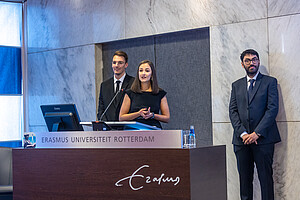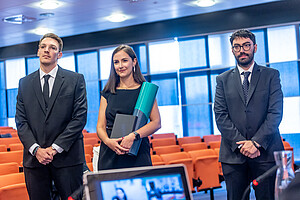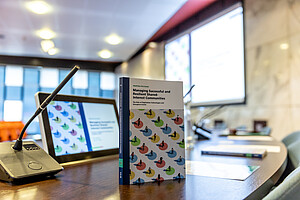PhD Defence Martina Pocchiari

In her dissertation ‘Managing Successful and Resilient Shared-Interest Communities: The role of digitization technologies and disruptive events’ Martina Pocchiari shed light into the dynamics of shared-interest communities under the influence of changing technologies and external events. Three questions were addressed: (i) What is the impact of digitizing community activities on the participation intentions of community members?; (ii) What is the effect of negative vs. positive shocks to a community's purpose on community dynamics?; (iii) What is the effect of a brand crisis on consumer engagement and patterns of information spread in brand communities? Martina defended her dissertation on Friday, 17 June at 13:00. Her supervisors were Prof. Gerrit van Bruggen (RSM) and Dr Jason Roos (RSM). The members of the Doctoral Committee were Dr Aurelie Lemmens (RSM), Dr Hannes Datta (Tilburg University), and Prof. Bas Donkers (ESE).
About Martina Pocchiari

Martina Pocchiari was born in Potenza, Italy on July 30, 1993. She holds a Bachelor of Science in Economics and Business cum laude from the University of Bologna, and a Master of Science in Marketing Management cum laude from the Rotterdam School of Management, Erasmus University. She pursued a PhD in Empirical Quantitative Marketing under the supervision of Dr. Jason M.T. Roos and Prof. Dr. Ir. Gerrit van Bruggen at the Rotterdam School of Management, Erasmus University. Since the start of her PhD in 2017, Martina studied the factors contributing to the success and resilience of shared-interest communities -- a topic that gained unparalleled relevance during the Covid–19 pandemic. Her work has been presented at prestigious international academic conferences, including the INFORMS Marketing Science conference, EMAC, the Journal of Marketing Research conference, and the IJRM conference. Her work has been featured in industry outlets, podcasts and newsletters for community management, and presented at the FOSDEM industry conference in 2021. Martina established successful research collaborations with international coauthors at the Hebrew University; the Wharton School, University of Pennsylvania; and MIT Sloan. She was a visiting research fellow at the Hebrew University, Jerusalem Business School in Spring 2022. Next to her research output, Martina has supervised close to 100 Bachelor students' theses at RSM. In August 2022, Martina will join the National University of Singapore, NUS Business School as an assistant professor of marketing. She will continue to research human interaction in digital platforms and online communities, and the consumption of products and information in increasingly digitized and complex environments.
Thesis Abstract

Shared-interest communities – social groups of people gathering around a common interest – represent a centralized source of information, knowledge, social support, and entertainment. Every day, millions of people resort to digital and in-person communities to meet, discuss, solve problems, and even manage disruptive situations, such as natural or civil crises, financial instability, and product recalls. Given the role of shared-interest communities in the lives of consumers, businesses, institutions, and citizens, several streams of literature investigated the antecedents of community participation, success, and resilience. However, it is still unclear how the emergence of new technologies and the occurrence of (often disruptive) external events relate to the success and sustainability of shared-interest communities. In three essays, this dissertation sheds light into the dynamics of shared-interest communities under the influence of changing technologies and external events. Three questions are addressed: (i) What is the impact of digitizing community activities on the participation intentions of community members?; (ii) What is the effect of negative vs. positive shocks to a community's purpose on community dynamics?; (iii) What is the effect of a brand crisis on consumer engagement and patterns of information spread in brand communities? This dissertation contributes to the scientific and managerial understanding of the circumstances that allow shared-interest communities to thrive in a complex world. As digitized human interactions become the new norm, and external events prompt dramatic collective action on digital platforms, the findings of this dissertation are both extremely timely and insightful for researchers, practitioners, and policy-makers alike.
View photos of Martina's PhD Defence
Photos: Chris Gorzemann / Capital Images


